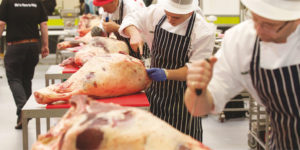Archaeologist careers guide
Do you love all things historical? If so, dig in and you might just unearth an amazing career in archaeology!
Getting into Archaeologist careers
An Archaeologist helps us to learn more about human history and prehistory by examining important sites, excavating (digging up) historical artefacts, studying the items they find, and using those items to inform knowledge and theories about the past.
Archaeology is not just dinosaurs…
Dinosaurs and fossils are amazing! But human history is amazing, too. As an Archaeologist in the UK you can discover our incredible heritage from e,g, the Bronze and Iron Age, helping us build a better understanding of how people used to live.
How Much Money Can You Earn As An Archaeologist?
These LMI Job Trends give you a sneak peek of how much you could earn starting out for this career, and how much your salary could grow with experience.
Salary guide for Archaeologist jobs
Recent labour market information says you can earn on average up to £34,840 a year as an Archaeologist.
Your starting salary can vary because of factors like level of experience, training, or location. Your salary will increase over time as you build skills, knowledge and experience.
Green Careers and Animal / Environmental Careers FAQs
Is there something you’d like to know about animal and environmental careers? Maybe we can help!
- DID YOU KNOW? You can get into these careers with T Levels!
- 5 tips on getting environmental jobs
- Green careers with the Environment Agency
- What are the UK’s best-paid environmental jobs?
- 5 reasons to explore ABP food industry careers
- You can get health & safety apprenticeships that help you study for a FREE degree!
- Nature volunteering can help your confidence and CV
What skills do you need?
Useful Skills To Put On Your CV:
- Computer skills. Archaeologists use a vast array of computer systems to support them in their explorations. Knowledge of areas such as computer aided design (CAD), digital illustration, and geographical information systems (GIS) will be particularly beneficial.
- Excellent teamwork. Archaeologists work as part of a team and may work with the same people on one site (or “dig”) for many months, so you’ll need to be a people person and a team player.
- Curiosity, open-mindedness, and a sense of adventure. Archaeologists are explorers and the best tend to be endlessly curious individuals with a thirst for knowledge.
- Research skills, as you will need to conduct research to determine how your finds fit in with existing historical knowledge and theory.
Strong written communication. Archaeologists produce and present written reports on their finds, meaning that great writing skills are essential. - Organisation and a methodical approach. As an Archaeologist, you will need to keep meticulous records of your digs and your findings.
- A good understanding of data and record-keeping.
- A passionate interest in history.
Top Skills-Boosting Tip
Check out the Archaeology Skills Passport, created by the British Archaeological Jobs Resource (BAJR.) This site contains a wealth of information about the primary, secondary, and tertiary skills you’ll need to become an Archaeologist.
How Do You Get These Skills?
Vocational qualifications and work experience will help you build these skills over time.
What Qualifications & Training Do You Need For Archaeologist Careers?
Apprenticeships
An apprenticeship is a scheme where you train while earning a starting salary. With an apprenticeship (or advanced apprenticeship) you’ll have a paid job with an employer that includes structured training and learning. This training leads to an official qualification that’s recognised by employers as an industry standard.
There are several different apprenticeships available in Archaeology, ranging from Level 3 Archaeological Technician apprenticeships through to Level 7 Archaeological Specialist apprenticeships, as well as many others in related areas and with related organisations. Have a look at the Chartered Institute for Archaeologists’ apprenticeships page and Historic England apprenticeships to learn more and find opportunities.
BTECs
As an alternative to A-Levels, you can do BTECs from the age of 16.
There are several BTEC options that can be a good springboard into a career in archaeology, including:
- Entry Level Certificate in History
- Accredited Level 2 Diploma in History
- Level 3 Diploma in Archaeology
- Level 3 Certificate in Archaeological Practice
- Level 3 Diploma in History
You’ll normally need 2 or more GCSEs at grades 9-3 (A*-D) or equivalent for a Level 2 or 3 course. If your qualifications are lower than this, you’ll most likely start on a Level 1 course.
A-Levels
A Levels are academic qualifications that come after GCSEs. A Levels can be an ideal stepping stone to a higher qualification such as an apprenticeship or degree in Archaeology. Needless to say, History and Ancient History are great choices for aspiring archaeologists.
Other good subjects you might consider include Classical Civilisation, Geology, Sociology, English, Maths, or science subjects such as Biology and Chemistry.
Degrees and University
Most practising Archaeologists have a university degree. Therefore, if you want to go into this field, you will likely need to plan to go to university. Numerous universities including Oxford, Cambridge, York, Manchester, Leicester, Exeter, Liverpool, and Nottingham (to name just a few) now offer undergraduate degrees in Archaeology.
Some universities also offer combined courses or degrees in particular areas of Archaeology, such as Archaeology and Heritage, Archaeology and Anthropology, Classical Archaeology, and Egyptology.
Postgraduate Degrees
If you already have a Bachelor’s degree, you can take a postgraduate qualification such as a Masters Degree in an Archaeology-related subject. Many professional Archaeologists have a postgraduate degree.
You can take a Masters Degree in Archaeology, as well as in more specialised areas such as Egyptology, Classical Archaeology, Classical Art and Archaeology, and Archaeological Practice.
Career progression
Many Archaeologists start their careers on fixed-term contracts doing archaeological fieldwork. This will be hard work and you’ll need to be physically fit and willing to work in all weathers, but you will gain valuable experience and it will make it much easier for you to land a permanent job later on. In addition to opportunities working at sites or “digs”, you might also work in settings such as a museum, laboratory, or office.
As your career progresses, numerous exciting options are open to you. You’ll be able to land contracts on more exciting digs. You might find yourself leading a team of Archaeologists, working on a self-employed or consultancy basis, specialising in a particular area of archaeology, undertaking research, taking a senior position in the museums and heritage sector, or teaching future archaeologists in higher education. You could become an Archaeological Conservator with Youth Friendly Employers like Historic England, analysing archaeological finds with clever, modern methods.
What Work Experience Do You Need For Archaeologist Jobs?
Work Experience Tips
Archaeology is a highly competitive career, with more hopefuls than available posts. This means that any experience you can gain will help you tremendously as you build your career.
Historic England offers short-term training placements as well as work experience placements for aspiring archaeologists twice per year, which offer a fantastic opportunity to learn more about this career path and what is involved.
You could also apply for work experience at organisations such as museums, heritage sites, Archaeology and Classics faculties at universities (such as Cambridge), and archaeological organisations and societies.
Examples of relevant work experience include:
- Work shadowing (even if it’s just for a day)
- Work placements in a company
- Work experience placements on a college or university course
Volunteering Tips
Volunteering always looks great on your CV, particularly when it is directly relevant to the job you hope to do. Fortunately, there are numerous volunteering opportunities available for aspiring Archaeologists, allowing you to gain hands-on experience and learn more about the field as well as building your CV for those future job applications.
Museums and heritage organisations such as Museum of London Archaeology (MOLA), industry bodies such as the Council for British Archaeology, community archaeological projects such as the Culver Project, city and county council archaeology units, university Archaeology departments, student Archaeology Societies, and hobbyist archaeology organisations are just some of the places you could look for volunteering opportunities.
What Does An Archaeologist Do?
Archaeology is a hugely varied and exciting career path. Archaeology involves exploring historical sites, discovering and examining artefacts which can tell us more about history and how people lived in the past.
Some Archaeologists work directly on the excavation sites (called “digs” by those in the profession), while others work in related environments such as museums, heritage sites, universities, research organisations, and local authorities.
Your exact daily responsibilities will depend on your level of seniority and which branch of Archaeology you work in, but we have included some examples below to give you a broad overview of some of the things you might do.
Example daily job responsibilities
- (For team leaders or Senior Archaeologists) managing a team of Archaeologists and volunteers and overseeing the dig
- Record findings (for example by making notes, drawing diagrams, and taking photographs)
- Clean, preserve, store, and transport found artefacts
- Produce and present written and verbal reports on finds
- Research, identify, and classify finds
- Conduct laboratory tests on found objects
- Work to ensure the preservation of historical artefacts, sites, and buildings
- Use various computer applications to record and interpret finds
- Create, oversee, or advise on museum displays of found artefacts
- Write and publish educational, publicity, and media materials on projects and notable finds
- Give educational talks and presentations to students or members of the public
- Liaise with other relevant bodies, such as cultural and heritage organisations or local government, to coordinate excavations
How To Find Archaeologist Jobs: Next Steps
If you choose to do an apprenticeship in Archaeology you may be offered a job at the end of your training. While this is not a guarantee, many employers will look more favourably on your application if you have completed an apprenticeship with them.
As we have mentioned, most Archaeologists have a degree. This means that there are many jobs available for talented new graduates. If you’re doing a degree in Archaeology, you should start looking and applying for jobs long before you graduate.
Once you have the appropriate skills and qualifications, you can also apply directly to organisations advertising for Archaeologists and related professionals.
Look for job titles like:
- Archaeologist
- Assistant Archaeologist
- Field Archaeologist
- Graduate Archaeologist
- Archaeological Consultant
Take a look at our database of local opportunities to see if there are any relevant jobs, work placements, or careers events and workshops to help you get started. Historic England also has several exciting vacancies for you to check out.
Historic England Early Careers
Discover early careers in heritage for all backgrounds, skills and interests.
Historic EnglandGet Into Environmental and Green Careers With Youth-Friendly Employers
These employers and organisations are here to help. They care about your potential and desire to learn, not just your qualifications and experience. They may be able to offer traineeships, apprenticeships, graduate schemes, first jobs, careers advice, wellbeing support and much more.
Agriculture, Animal & Environment Career Tips & Opportunities
Have You Thought About These Agriculture, Animal & Environment Careers?
View job descriptions with average UK salary, useful qualifications and a wide range of routes into each career.
-
Archaeologist Careers
-
Bin Collector / Refuse Collector Jobs & Careers
-
ABP Apprenticeships, Graduate Schemes and Early Careers
-
Graduate Schemes with ABP
-
Apprenticeships with Youth Friendly Employer ABP
-
QESH (Quality, Environment, Safety & Health) Degree Apprenticeship with Coca-Cola Europacific Partners
See All Our Youth-Friendly Employers






































































YES! I Want More Free Careers Help...
So what are you waiting for? Grab your future.







































